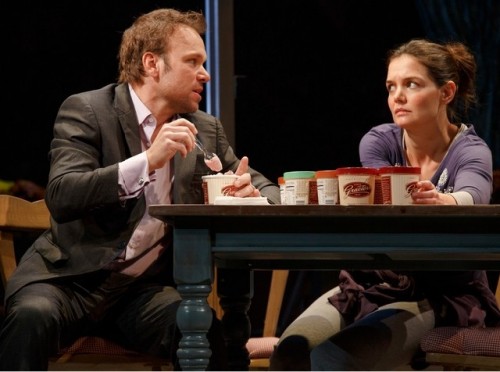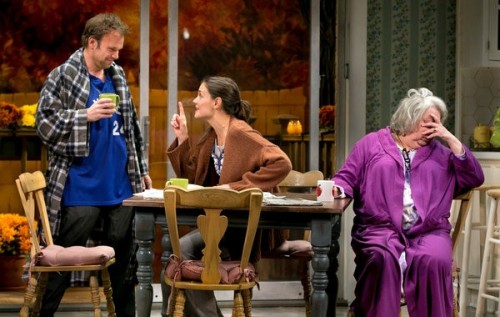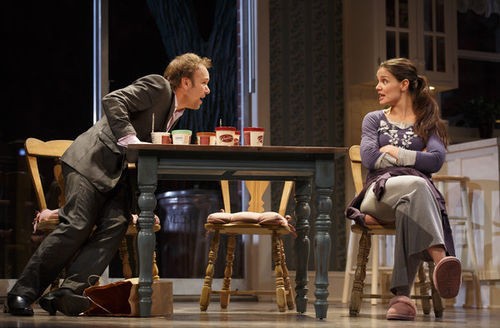Dead Accounts By Theresa Rebeck
Show Me the Money
By: Charles Giuliano - Dec 14, 2012
Dead Accounts
By Theresa Rebeck
Directed by Jack O’Brien
Sets by David Rockwell; Costumes by Catherine Zuber; Lighting by David Weiner; Music and Sound by Mark Bennett; Hair Design by Tom Watson; Technical Supervision by Peter Fulbright/Tech Production Services; Production Stage Manager, Rolt Smith; Associate Producers, Jamie Kaye-Phillips and Charles Stone; General Manager, 101 Productions. Presented by Jeffrey Finn, John N. Hart, Jr., David Mirvish, Amy Nauiokas, Ergo Entertainment, Harriet Newman Leve, Double Gemini Productions, 3toGo Entertainment and the Shubert Organization.
The Music Box Theater
239 West 45th Street, Manhattan
(212) 239-6200, telecharge.com
Through Feb. 24
Running time: two hours.
WITH: Norbert Leo Butz (Jack), Katie Holmes (Lorna), Judy Greer (Jenny), Josh Hamilton (Phil) and Jayne Houdyshell (Barbara).
Dead Accounts is the third and weakest Broadway production of the enormously gifted, but here adrift, playwright Theresa Rebeck. The other two were Mauritius which we covered during its 2006 premiere at Huntington Theatre in Boston, then last year’s Seminar. Arguably her best play The Understudy premiered at the Williamstown Theatre Festival 2008 before a run Off Broadway. In 2009 Elizabeth Aspenlieder starred in the one woman show Bad Dates for Shakespeare & Company.
While Rebeck has been widely admired in the theatre community she became a bankable star as the creator of the stunning TV series Smash which returns this year without her. One may only imagine the collateral damage for an artist of her quality trying to maintain control of a commercial television production.
Is it fair to comment that she was likely distracted and not on top of her game in bringing to production Dead Accounts which a headline described as arriving DOA. In her struggles with the genre of TV one wonders just who got the upper hand. Here, ironically, Rebeck has delivered what is at best a half baked sit-com.
While never passing up the opportunity to see new work by such a remarkable playwright half way through the first act I was wondering when we might know what the heck we were looking at.
Until then, we were subjected to an orgy of over the top, strident, physical comedy by a deranged and disheveled Norbert Leo Butz as Jack. Wearing what is described as an Armani suit its disarray suggests something scavenged from Goodwill. Which serves as a metaphor for his puffed up, clunky, wide of the mark performance. Like Armani he has the branding of a Tony Award but here that equated to a fire sale of shtick and damaged comedic goods.
We find ourselves in the numbingly generic, middle class kitchen of a home in suburban Cincinnati (designed by David Rockwell). There is a door leading to the back yard with enormous trees and fall foliage.
It is a plot point that the trees were planted some 20 years prior during Arbor Day by Jack’s stay at home, spinster sister, Lorna. She is played blandly by the famous (for all the wrong reasons) but plain and ordinary Katie Holmes. Her performance is as frumpy as the generic, shapeless threads that Catherine Zuber has dressed her with. Apparently, those now mature trees are among her few tangible accomplishments in life.
As Jack’s sis she is not much more than set decoration as Butz chews not just the scenery but massive amounts of locally famous junk and comfort food from coffee to ice cream and pizza. Apparently, he is eating his way through a crisis on the lam from his life in New York as a banker. It was a job set up for him by his father-in-law; a wedding present for marrying Jenny (Judy Greer) who is frosty and uppity old money.
How a woman of breeding, social status, wealth and refinement could have hooked up with a crass, potty mouthed, trashy lout is never for a second credible. Jack has hightailed it back home on the run from a messy divorce with a twist as is revealed with her surprise appearance at the end of Act One.
Which is way too long to get to the point of what the friggin play is all about.
Instead, we are given an hour of improv intended to bask in the glory of the comedic riffs of Butz. No way Jose. Rarely have I encountered a less compelling actor. He is so self absorbed that he chokes on his own ersatz genius. From my front row seat I resisted an urge to bolt onto the stage to perform the Heimlich maneuver.
The other actors, Lorna, a best friend from back in high school, Phil (Josh Hamilton) and his Mom (Jayne Houdyshell), are just things to bounce off of. Even the arrival of Jenny fails to add much heat or flavor to the sauce which Jack is frantically and manically stirring. Other than the overblown Jack the other characters utterly lack dramatic dimension. Hamilton, in particular, reminded me of Jim Carrey’s Truman where his “best friend” shows up with a six pack handed to him by stage hands.
Rebeck provides tentacles and feelers to her dominant character. It seems that Phil, in a grossly underplayed performance misdirected by a mostly inept Jack O’Brien, has an unrequited high school crush on Lorna. Ages ago he asked her out once and got shot down. We learn that she had a conflict and wonders why he never tried again. Yes, they hook up. Then there is a matronly Mom who is tending to Dad an unseen character struggling with the pain of passing kidney stones. There is a bit about whether Jack will go upstairs and see him. It’s annoyingly familiar terrain.
When not gorging on comfort food, or extolling the virtues of the Midwest, there are hints about his sudden return home. This entailed a lot of easy jokes about New York which evoked laughter from a few natives in the audience while the majority of tourists remained mute.
A clue entailed a family heirloom, The Pilgrim teapot, which was given to them as a wedding present. It has disappeared from the bank vault. Jack broadly suggests that he is not surprised how things have a way of going missing in banks.
Like the $27 million in Dead Accounts which Jack has embezzled. With some moral legerdemain he argues that it is lost money that sits inactively in the bank because nobody claims it. In his construct it doesn’t really belong to anyone. He has just liberated accounts which nobody seems to notice.
Except for his estranged wife. She wavers between turning him in as a thief and demanding half as her share of the divorce. Between their bickering, when she makes a sudden appearance and becomes a focal point of the muddled second act, Jack demonstrates lingering hopes of reconciliation.
But as ersatz marriage councilors the audience must conclude that they have zilch in common. Also, it seems, she’s a snob and bitch on wheels.
In a revealing scene she is alone in the bourgeois kitchen talking on a cell phone to her new lover. In glaring detail she describes the tacky cabinets, generic china, and flat ware which she thinks, good grief, is made of stainless steel. She does not see her mother-in-law who has overheard this hateful and demeaning dialogue.
It encapsulates Jenny’s contempt for Jack’s middle class family. With measured dignity her mother-in-law relates to the chagrined shrew that the bone china is in a cabinet in the dining room along with the heirloom family silver.
The confrontation highlights the apogee of Rebeck’s screed comparing and contrasting the wholesome family values of the Midwest vs. the autocratic, elitism of the Eastern establishment. Jenny’s terrible remarks evoked those of Romney which were secretly recorded during a fundraiser with the mega rich and privileged.
Republicans suck.
Rebeck plays us with an “us vs. them” dichotomy which attempts to morph Jack into an ersatz Robin Hood. Arguably, she is providing an update of Woody Guthrie’s Depression era anthem on the bank robber Pretty Boy Floyd.
"Well, you say that I'm an outlaw,
You say that I'm a thief.
Here's a Christmas dinner
For the families on relief."
“Yes, as through this world I've wandered
I've seen lots of funny men;
Some will rob you with a six-gun,
And some with a fountain pen.
“And as through your life you travel,
Yes, as through your life you roam,
You won't never see an outlaw
Drive a family from their home.”
Well, nice try Theresa. Not this time.




